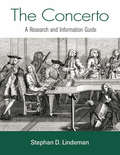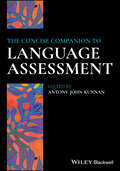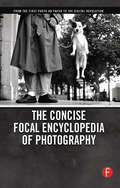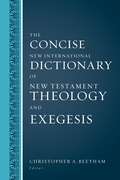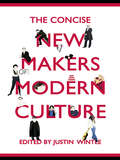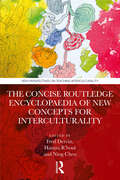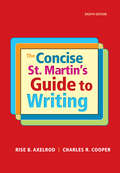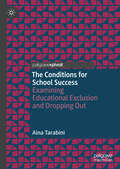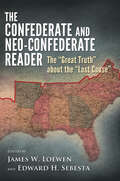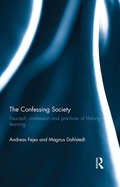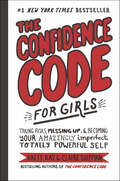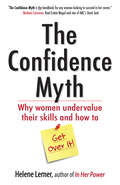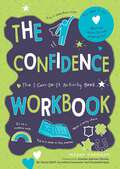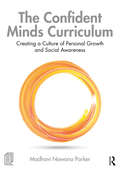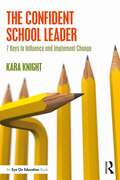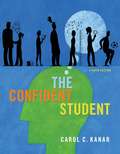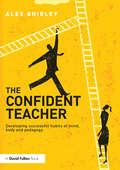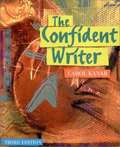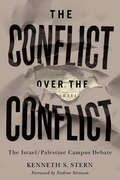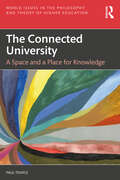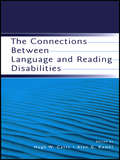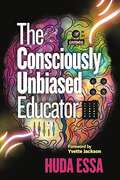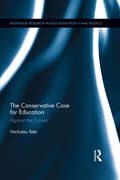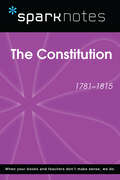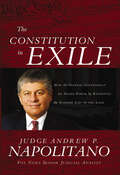- Table View
- List View
The Concerto: A Research and Information Guide (Routledge Music Bibliographies #Vol. N28)
by Stephan D. LindemanTwelve-tone and serial music were dominant forms of composition following World War II and remained so at least through the mid-1970s. In 1961, Ann Phillips Basart published the pioneering bibliographic work in the field.
The Concise Companion to Language Assessment
by Antony John KunnanThe Concise Companion to Language Assessment provides a state-of-the-art overview of the crucial areas of language assessment, teaching, and learning. Edited by one of the foremost scholars in the field, The Concise Companion combines newly commissioned articles on innovations in assessment with a selection of chapters from The Companion to Language Assessment, the landmark four-volume reference work first published in 2013. Presented in eight themes, The Concise Companion addresses a broad range of language assessment methods, issues, and contexts. Forty-five chapters cover assessment conceptualization, development, research, and policy, as well as recent changes in language assessment technology, learning-oriented assessment, teacher-based assessment, teacher assessment literacy, plurilingual assessment, assessment for immigration, and more. Exploring the past, present, and future possibilities of the dynamic field, The Concise Companion to Language Assessment: Contains dedicated chapters on listening, speaking, reading writing, vocabulary, pronunciation, intercultural competence, and other language skills Describes fundamental assessment design and scoring guidelines, as well as advanced concepts in scenario-based assessment and automated performance scoring Provides insights on different assessment environments, such as classrooms, universities, employment, immigration, and healthcare Covers various qualitative and quantitative research methods, including introspective methods, classical reliability, and structural equation modeling Discusses the impacts of colonialism and discrimination on the history of language assessment Explores the use of AI in writing evaluation, plagiarism and cheating detection, and other assessment contexts Sure to become a standard text for the next generation of applied linguistics students, The Concise Companion to Language Assessment is an invaluable textbook for undergraduate and graduate courses in applied linguistics, language assessment, TESOL, second language acquisition, and language policy.
The Concise Focal Encyclopedia of Photography: From the First Photo on Paper to the Digital Revolution
by Michael R. Peres Mark Osterman Grant B. R Omer Nancy M. Stuart J. Tomas LopezDefining photography is impossible. Revealing it is another matter, and that's what The Concise Focal Encyclopedia of Photography does,with each turn of the page.History: The technical origins and evolution of photography are half of the story. The other half consists of the ways that cultural forces have transformed photography into a constellation of practices more diverse than any other mode of representation. Photographers can tell a more in-depth story through a photo like Dorothea Lange's "Migrant Mother" than a journalist ever could with the written word alone.Major themes and practitioners: Over 25 entries, many with supporting illustrations,examine the figures, trends, and ideas that have contributed most heavily to the history and current state of photography.Contemporary issues: The issues influencing photography today are more complex than at any other time in its history. Questions of ethics, desire, perception, digitization, and commercialization all vie for attention. Hear what the experts have to say about crucialissues such as whether or not the images we take today will last the test of time, and if so, how?When material is covered this skillfully, "concise" is no compromise. The Concise Focal Encyclopedia of Photography is packed with useful information, compellingideas, and - best of all - pure pleasure.
The Concise New International Dictionary of New Testament Theology and Exegesis
by ZondervanThe Exegesis Quick-Reference Tool Every Pastor, Teacher, Student, and Scholar NeedsThe Concise New International Dictionary of New Testament Theology and Exegesis (CNIDNTTE) by Christopher A. Beetham is a significant resource for those looking for a quick-reference guide to aid in exegesis and interpretation. It retains all the essentials of the monumental and magisterial New International Dictionary of New Testament Theology and Exegesis edited by Moises Silva, bringing together its most important elements into one accessible volume. This reference includes the most vital, relevant information needed to delve deep into the study of the Greek words used in Scripture for study of the New Testament--its texts and theology.This volume offers a wealth of background and information on the meaning of Greek words in the New Testament, as well as related usage in classical Greek sources, the Greek Old Testament (Septuagint), and extrabiblical Second Temple Jewish literature. This significant tool offers the following features:All the nearly 800 entries covering over 3,000 Greek words found in the full edition are included and presented in the same order and arrangementRetains approximately 60 percent of the original edition, with the emphasis now on synchronic word study and usage in the Greek Old Testament, extrabiblical Second Temple literature, and especially the New TestamentThe unique arrangement according to Greek words and use of English concepts is retained from the full edition and allows all users to access Greek terms regardless of their level of competence in Greek.This edition retains the significant semantic-domain tool that directs the reader to all the Greek words that have something to do with a particular English word or concept. For example, under the English words "Resurrection," there is a list of four Greek words that are related to that topic.Discussions reflect the latest in modern scholarshipBibliographies retain essential references to other standard lexicons and theological dictionariesThe Concise New International Dictionary of New Testament Theology and Exegesis is the ideal tool for pastors, Bible teachers, students, and scholars engaging in exegesis. It is packed with the essential information needed to study the New Testament.
The Concise New Makers of Modern Culture
by Justin WintleA Who's Who of Western culture, from Woody Allen to Emile Zola... Containing four hundred essay-style entries, and covering the period from 1850 to the present, The Concise New Makers of Modern Culture includes artists, writers, dramatists, architects, philosophers, anthropologists, scientists, sociologists, major political figures, composers, film-makers and many other culturally significant individuals and is thoroughly international in its purview. Next to Karl Marx is Bob Marley, with John Ruskin is Salman Rushdie, alongside Darwin is Luigi Dallapiccola, Deng Xiaoping rubs shoulders with Jacques Derrida as do Julia Kristeva and Kropotkin. With its global reach, The Concise New Makers of Modern Culture provides a multi-voiced witness of the contemporary thinking world. The entries carry short bibliographies and there is thorough cross-referencing as well as an index of names and key terms.
The Concise Routledge Encyclopaedia of New Concepts for Interculturality (New Perspectives on Teaching Interculturality)
by Fred Dervin Ning Chen Hamza R’boulThis groundbreaking encyclopaedia presents 74 innovative concepts selected and elaborated by multilingual scholars, enriching critical discussions of the notion of interculturality in global scholarship.Many scholars are currently attempting to un-re-think and decolonize interculturality in different fields of research. Although ideas are critiqued and revised, this is happening in very similar linguistic terms as before. These potential attempts to decentre and decolonize could then be put into question. This book argues that knowledge production and negotiation should be exercised through alternative linguistic strategies, not for the sake of sounding different, but to advance new ways of defining, knowing and problematizing. The need to develop concepts in English and other languages is thus promoted in this encyclopaedia.Students, scholars and teachers with a sound background in intercultural studies will benefit most from the book. It will also appeal to anyone wishing to explore new ways of thinking, researching, speaking and writing about interculturality.
The Concise St. Martin’s Guide to Writing (Eighth Edition)
by Rise B. Axelrod Charles R. CooperThe new Concise St. Martin's Guide to Writing provides streamlined coverage of the six most commonly assigned genres in first-year composition, including remembering events, writing profiles, explaining concepts, arguing a position, proposing a solution, and justifying an evaluation. The Concise Guide leads students through the writing process: Guides to Reading equip students to analyze a genre's basic features, and Axelrod and Cooper's distinctive Guides to Writing help students apply their analysis of reading to the development of their own writing projects. With a new introductory chapter ("Composing Literacy") on writing a literacy narrative, a new assignment chapter on analyzing and synthesizing opposing arguments, and a new chapter on analyzing and composing multimodal texts, the Concise Guide helps students accomplish their writing goals from start to finish.
The Conditions for School Success: Examining Educational Exclusion and Dropping Out
by Aina TarabiniThis book analyses the role played by schools themselves in the high rates of educational exclusion and dropping out that affects many European education systems. The author frames the analysis according to three aspects of justice – redistribution, recognition and care – to explore both how teachers explain and react to the processes of educational failure and early school leaving, and how young people make sense and cope with the same failures. Using extensive qualitative data from schools in the Barcelona area, the author analyses the impact of school segregation, methods for managing diversity and teaching expectations: and subsequently how they can contribute to the production and reproduction of the risks of failure and ESL in contemporary education systems. This book will be of interest and value to students and scholars of educational exclusion, as well as school leaders.
The Confederate and Neo-Confederate Reader: The Great Truth about the Lost Cause
by James W. Loewen and Edward H. SebestaMost Americans hold basic misconceptions about the Confederacy, the Civil War, and the actions of subsequent neo-Confederates. For example, two thirds of Americans—including most history teachers—think the Confederate States seceded for “states' rights.” This error persists because most have never read the key documents about the Confederacy. These documents have always been there. When South Carolina seceded, it published “Declaration of the Immediate Causes Which Induce and Justify the Secession of South Carolina from the Federal Union.” The document actually opposes states' rights. Its authors argue that Northern states were ignoring the rights of slave owners as identified by Congress and in the Constitution. Similarly, Mississippi's “Declaration of the Immediate Causes. . .” says, “Our position is thoroughly identified with the institution of slavery—the greatest material interest of the world.” Later documents in this collection show how neo-Confederates obfuscated this truth, starting around 1890. The evidence also points to the centrality of race in neo-Confederate thought even today and to the continuing importance of neo-Confederate ideas in American political life. The 150th anniversary of secession and civil war provides a moment for all Americans to read these documents, properly set in context by award-winning sociologist and historian James W. Loewen and coeditor, Edward H. Sebesta, to put in perspective the mythology of the Old South.
The Confessing Society: Foucault, Confession and Practices of Lifelong Learning
by Magnus Dahlstedt Andreas Fejes"I highly appreciate the quality of Fejes’ and Dahlstedt’s research and writing. They manage to present in a comprehensible way some essential concepts of Foucault that help us to understand better what practices of lifelong learning, in a broad sense, are emerging nowadays in advanced liberal societies. In doing so, they contribute to the renewal of critical thinking in education. They convince me that such renewal is important and necessary… and I think both theoreticians and practitioners of lifelong learning will equally recognize and value this analysis, particularly also, because they present a good mix of theory and practice." -Professor Danny Wildemeersch Today, people are constantly encouraged to verbalise and disclose their "true" inner self to others, whether on TV shows, in newspapers, in family life or together with friends. Such encouragement to disclose the self has proliferated through discourses on lifelong learning through which each citizen is encouraged to become a constant learner. The Confessing Society takes a critical stance towards the modern relentless will to disclose the self and argues that society has become a confessing society. Drawing on Foucault’s later work on confession and governmentality, this book carefully analyses how confession operates within practices of lifelong learning as a way to shape activated and responsible citizens and provides examples of how it might be possible to traverse the confessional truth of the present time. Chapters include: Reflection and Reflective Practices Deliberation and Therapeutic Intervention Lifelong Guidance Medialised Parenting This controversial book is international in its scope and pursues current debates regarding trans-national policy and to research discussions on education, lifelong learning and governance, and it will provoke lively debate amongst educational practitioners, academics, postgraduate and research students in education and lifelong learning in Europe, North America and Australasia.
The Confidence Code for Girls: Taking Risks, Messing Up, & Becoming Your Amazingly Imperfect, Totally Powerful Self
by Claire Shipman Katty Kay JillEllyn RileyNew York Times, USA Today, and Wall Street Journal Bestseller!Girls can rule the world—all they need is confidence. This empowering, entertaining guide from the bestselling authors of The Confidence Code gives girls the essential yet elusive code to becoming bold, brave, and fearless. Packed with graphic novel strips; appealing illustrations; fun lists, quizzes, and challenges; and true stories from tons of real girls, The Confidence Code for Girls teaches girls to embrace risk, deal with failure, and be their most authentic selves.It’s a paradox familiar to parents everywhere: girls are achieving like never before, yet they’re consumed with doubt on the inside. Girls worry constantly about how they look, what people think, whether to try out for a sports team or school play, why they aren’t getting “perfect” grades, and how many likes and followers they have online.Katty Kay and Claire Shipman use cutting-edge science and research, as well as proven methods of behavioral change, to reach girls just when they need it the most—the tween and teen years.Plus don't miss Living the Confidence Code! Packed with photos, graphic novel strips, and engaging interviews, Living the Confidence Code proves that no matter who you are, or how old you are, nothing is out of reach when you decide to try.
The Confidence Myth: Why Women Undervalue Their Skills, and How to Get Over It
by Helene LernerNot only do we need more female leaders at the top, but we need more women at all levels of business, government, and nonprofits to step up—there's no time to waste. The problem, says Helene Lerner, isn't so much that women lack confidence but that they misunderstand what confidence really is. True confidence isn't fearlessness; it's having the courage to jump in even when your knees are shaking. Any woman who waits until she feels 100 percent confident before offering a big idea or asking for a raise or promotion will never get anywhere. Drawing on her own and other female leaders' experiences, as well as on her survey of over 500 working women, Lerner lays out practical strategies for beating this confidence myth and overcoming obstacles like gender bias. The book features dozens of Confidence Sparks, simple but powerful exercises and techniques that can catapult anyone's career to the next level.
The Confidence Workbook: The I-Can-Do-It Activity Book
by Imogen HarrisonEveryone feels nervous sometimes - perhaps because we're trying something new, or because we worry we're not good enough.The Confidence Workbook is here to help by showing you how to build your confidence, offering creative ways to develop your strengths, such as speaking up and believing in yourself when you need to say "I can!"
The Confident Minds Curriculum: Creating a Culture of Personal Growth and Social Awareness
by Madhavi Nawana ParkerThe Confident Minds Curriculum provides a simple and practical approach to culture change in schools, health care settings and organisations working with young people. Refraining from focusing solely on young people’s growth, the curriculum provides logical and practical support to the people and systems in their environment to enable and maximise growth for positive and connected communities. Crucial mindsets for healthy relationships, empathy, compassion, problem-solving, emotional intelligence and well-being are broken down into bite-size, teachable chunks. All blend together exquisitely to help people look at themselves and others with confidence, gratitude and compassion. Easily applied to individuals, targeted groups and whole classes to meet the social emotional learning (SEL) or well-being curriculum, this book provides a guiding light for young people and their supporters to develop what is necessary for socially and emotionally intelligent environments. Aimed primarily at the middle years (8–14), it is easily adaptable for younger and older students. Through role plays, discussions, journaling and practical activities each new mindset is divided into several lessons that teach individual learning components of new ways of thinking, feeling and behaving. The Confident Minds Curriculum will appeal to teachers, educators and health professionals searching for a whole school or organisational approach to social emotional learning, well-being, compassion and personal growth. It is also an essential resource for homes where parents and carers can help further develop life skills that build character and optimism so their family can approach life with greater confidence.
The Confident School Leader: 7 Keys to Influence and Implement Change
by Kara KnightThis exciting resource will help you build confidence in yourself as an educational leader. Written by an award-winning leader, this book encourages readers to use research-based strategies to lead in meaningful, authentic ways that make the greatest impact on students and staff members each day. Full of real-life stories and key takeaways, readers will walk away from this book with a better plan for reinvigorating their leadership skills and awaken the confidence within. Whether you are a future administrator, a new principal, or a veteran administrator, the seven key leadership themes in this book will guide you in influencing and implementing change to effectively lead your school.
The Confident Student 8th Edition
by Carol C. KanarThe Confident Student, Eighth Edition helps both the first-time college student and the older returning student make the transition to academic life and work. Updated Design, Thinking with Bloom, Get Connected, A more intentional Focus on Reflective Thinking, New Material in several Chapters are unique features of this book.
The Confident Teacher: Developing successful habits of mind, body and pedagogy
by Alex QuigleyThe Confident Teacher offers a practical, step-by-step guide to developing the habits, characteristics and pedagogy that will enable you to do the best job possible. It unveils the tacit knowledge of great teachers and combines it with respected research and popular psychology. Covering topics such as organisation, using your body language effectively, combatting stress, managing student behaviour, questioning and feedback, and developing confident students, it shows how you can build the confidence and skill to flourish in the classroom. This book will be an essential resource for all qualified and trainee teachers wanting to reach their full potential in this challenging but rewarding profession.
The Confident Writer (3rd edition)
by Carol C. KanarThe Confident Writer functions simultaneously as a rhetoric with readings, a research guide, and a handbook.
The Conflict over the Conflict: The Israel/Palestine Campus Debate (G - Reference,information And Interdisciplinary Subjects Ser.)
by Kenneth S. SternThe Conflict over the Conflict chronicles one of the most divisive and toxic issues on today’s college and university campuses: Israel/Palestine. Some pro-Palestinian students call supporters of Israel's right to exist racist, and disrupt their events. Some pro-Israel students label pro-Palestinian students terrorists, and the Jews among them traitors. Lawsuits are filed. Legislation is proposed. Faculty members are blacklisted and receive death threats. Academic freedom is compromised and the entire academic enterprise is threatened. How did we get here and what can be done? In this passionate book, Kenneth S. Stern examines attempts from each side to censor the other at a time when some say students, rather than being challenged to wrestle with difficult issues and ideas, are being quarantined from them. He uniquely frames the examination: our ability to think rationally is inhibited when our identity is fiercely connected to an issue of perceived social justice or injustice, and our proclivity to see in-groups and out-groups – us versus them – is obvious. According to Stern, the campus is the best place to mine this conflict and our intense views about it to help future generations do what they are supposed to do: think. The Conflict over the Conflict shows how this is possible.
The Connected University: A Space and a Place for Knowledge (World Issues in the Philosophy and Theory of Higher Education)
by Paul TempleUniversities are primarily social institutions, but they are also physical, material structures. This book bridges this divide by examining the links between the two and explores how good connectivity can result in a more effective university.Through an original study of connectivity in university design, Paul Temple explores what it is, why it’s important, and how it works. Using case studies and practical examples to examine the nature of social and material interactions, this book reviews what is known about connectivity and how it can be used to enhance academic effectiveness.This book will be of interest to academics, students, and researchers interested in higher education theory and practice, the philosophy of higher education, and those working at the interface between higher education studies and architecture and design.
The Connections Between Language and Reading Disabilities
by Alan G. Kamhi Hugh W. CattsThis is an edited book based on papers presented at a 2003 invitee-only conference under the sponsorship of the Merrill Advanced Studies Center of the University of Kansas. The participants were prominent scholars in the areas of language and reading, and have research programs funded by NIH and other sources. The purpose of the gathering was to discuss theoretical issues and research findings concerning the relationship between developmental language and reading disabilities, specifically looking at neurological, behavioral, and genetic factors. In addition, it discussed other factors contributing to reading difficulties in the middle elementary school years through adolescence and literacy outcomes for children with early language impairments, and how these problems relate to children with dyslexia. The Foreword is written by Reid Lyon, Branch Chief, Child Development and Behavior Branch, NICHD-National Institutes of Health.This book appeals to scholars in the areas of language disorders and reading disabilities, as well as to practicing speech-language pathologists, special educators, and reading specialists. It may also be used in graduate courses designed as seminars in either language disorders or reading disabilities in schools of communication disorders, as well as schools of education--especially special education departments.
The Consciously Unbiased Educator
by Huda EssaEducators must achieve cultural proficiency to overcome unconscious biases and tap the limitless potential of their school communities. <p><p> In The Consciously Unbiased Educator, cultural proficiency expert and former teacher Huda Essa helps educators uncover and surmount the limitations of unconscious biases—stereotypes that form below the surface of our awareness, making them harder to detect. Although these biases aren't formed with the intent to do harm, if they are not interrupted, they contribute to negative outcomes for students. <p><p> With warmth and wisdom, Essa urges educators to move past any reflexive defensiveness or shame that comes with facing these biases to take a journey that will ultimately empower and benefit the entire school community. Filled with rich, clarifying insights drawn from Essa's own experience as well as comprehensive research findings, this inspirational resource pushes readers' thinking to new levels.
The Conservative Case for Education: Against the Current (Routledge Research in Education Policy and Politics)
by Nicholas TateThe Conservative Case for Education argues that educational thinking in English-speaking countries over the last fifty years has been massively influenced by a dominant liberal ideology based on unchallenged assumptions. Conservative voices pushing against the current of this ideology have been few, but powerful and drawn from across the political spectrum. The book shows how these twentieth-century voices remain highly relevant today, using them to make a conservative case for education. Written by a former government adviser and head teacher, the book focuses on four of the most powerful of these conservative voices: the poet and social critic T. S. Eliot, the philosopher Michael Oakeshott, the political thinker Hannah Arendt and the educationist E D Hirsch. In the case of each thinker, the book shows how their ideas throw fresh light on contemporary educational issues. These issues range widely across current educational practice and include: creativity, cultural literacy, mindfulness, the place of religion in schools, education for citizenship, the teaching of history and Classics, the authority of the teacher, the arguments for and against a national curriculum, the educational response to cultural diversity, and more. A concluding chapter sums up the conservative case for education in a set of Principles that would be acceptable to many from the Left, as well as the Right of the political spectrum. The book should be of particular interest to educators and educational policy makers at a time when ‘conservative’ governments are in power in the UK and the USA, as well as to researchers, academics and postgraduate students engaged in the study of educational policy, or those studying educational issues from an ethical, philosophical and cultural standpoint.
The Constitution (SparkNotes History Notes)
by SparkNotesThe Constitution (1781-1815) (SparkNotes History Note) Making the reading experience fun! SparkNotes History Guides help students strengthen their grasp of history by focusing on individual eras or episodes in U.S. or world history. Breaking history up into digestible lessons, the History Guides make it easier for students to see how events, figures, movements, and trends interrelate. SparkNotes History Guides are perfect for high school and college history classes, for students studying for History AP Test or SAT Subject Tests, and simply as general reference tools.Each note contains a general overview of historical context, a concise summary of events, lists of key people and terms, in-depth summary and analysis with timelines, study questions and suggested essay topics, and a 50-question review quiz.
The Constitution in Exile: How the Federal Government Has Seized Power by Rewriting the Supreme Law of the Land
by Andrew P. NapolitanoWhat ever happened to our inalienable rights?The Constitution was once the bedrock of our country, an unpretentious parchment that boldly established the God-given rights and freedoms of America. Today that parchment has been shred to ribbons, explains Fox News senior judicial analyst Judge Andrew P. Napolitano, as the federal government trounces state and individual rights and expands its reach far beyond what the Framers intended.An important follow-up to Judge Napolitano's best-selling Constitutional Chaos, this book shows with no-nonsense clarity how Congress has "purchased" regulations by bribing states and explains how the Supreme Court has devised historically inaccurate, logically inconsistent, and even laughable justifications to approve what Congress has done. It's an exciting excursion into the dark corners of the law, showing how do-gooders, busybodies, and control freaks in government disregard the limitations imposed upon Congress by the Constitution and enact laws, illegal and unnatural, in virtually every area of human endeavor. Praise for The Constitution in Exile from Left, Right, and Center"Does anyone understand the vision of America's founding fathers? The courts and Congress apparently don't have a clue. But Judge Andrew P. Napolitano does, and so will you, if you read The Constitution in Exile."-BILL O'REILLY"Whatever happened to states rights, limited government, and natural law? Judge Napolitano, in his own inimitable style, takes us on a fascinating tour of the destruction of constitutional government. If you want to know how the federal government got so big and fat, read this book. Agree or disagree, this book will make you think."-SEAN HANNITY"In all of the American media, Judge Andrew P. Napolitano is the most persistent, uncompromising guardian of both the letter and the spirit of the Constitution, very much including the Bill of Rights. Increasingly, our Constitution is in clear and present danger. Judge Napolitano--in The Constitution in Exile--has challenged all Americans across party lines to learn the extent of this constitutional crisis." -NAT HENTOFF"Judge Napolitano engages here in what I do every day on my program-make you think. There's no question that potential Supreme Court nominees and what our Constitution says and doesn't say played a major role for many voters in our last couple of elections. What the judge does here is detail why the federal government claims it can regulate as well as tax everything in sight as it grows and grows. Agree or disagree with him-you need to read his latest book, think, and begin to arm yourself as you enter this important debate." -RUSH LIMBAUGH"At a time when we are, in Benjamin Franklin's words, sacrificing essential liberty to purchase a little temporary safety, here comes the judge with what should be mandatory reading for the executive branch cronies who are busy stealing power while they think we're not watching. Thank goodness the judge is watching and speaking truth to power. More than a book, this is an emergency call to philosophical arms, one we must heed before it's too late." -ALAN COLMES
